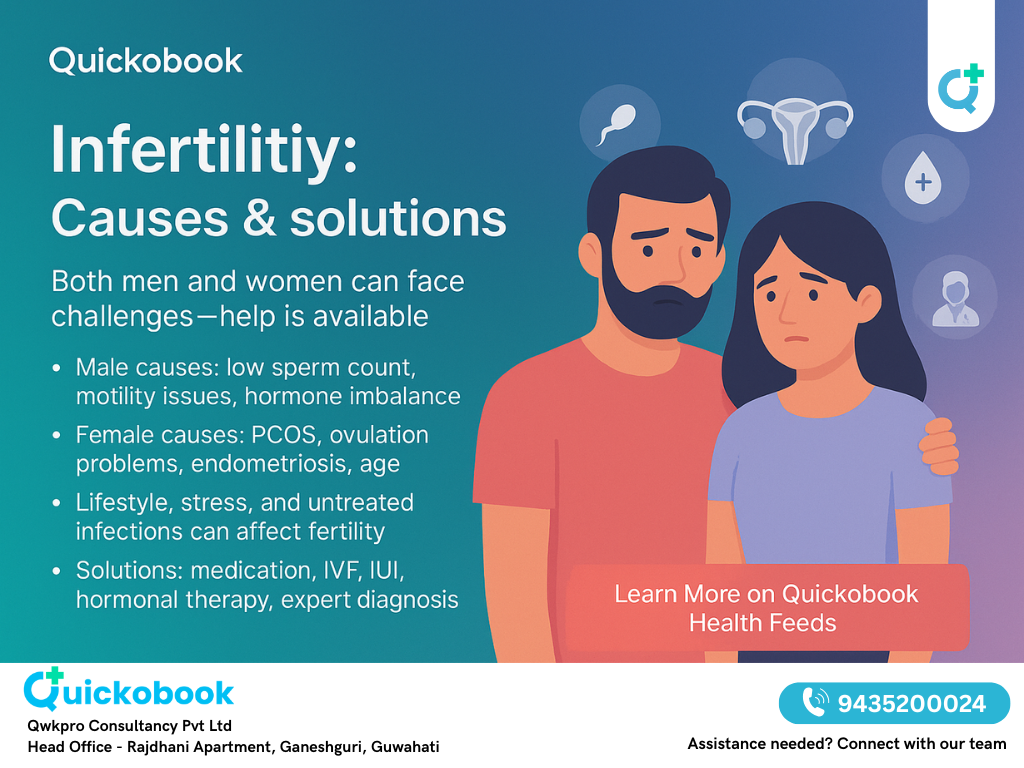Introduction
Infertility is a growing concern among couples in India. It refers to the inability to conceive after 12 months of regular, unprotected sexual intercourse. Both men and women can face infertility, and common factors include PCOS infertility in women and low sperm count in men. With medical advancements, effective treatments like IVF, IUI, and medication are available. Lifestyle changes and early medical consultation can also improve outcomes. Platforms like Quickobook make it easier to book fertility doctors, order medicines, and get guidance.
What is Infertility?
Infertility is a medical condition where a couple cannot conceive despite regular attempts for over a year. In India, it affects about 10–15% of married couples. It may be due to female factors (ovulation disorders, PCOS, blocked tubes) or male factors (low sperm count, poor sperm motility).
Types of Infertility
- Primary infertility: No prior pregnancies
- Secondary infertility: Difficulty conceiving after a previous pregnancy
Causes of Infertility in Women
- PCOS (Polycystic Ovary Syndrome) – leading cause of infertility due to irregular ovulation.
- Hormonal imbalances – affecting egg release.
- Blocked fallopian tubes – often from infections or endometriosis.
- Age factor – fertility decreases sharply after 35.
- Lifestyle habits – stress, obesity, smoking, alcohol.
Causes of Infertility in Men
- Low sperm count – reduced number of sperm.
- Poor sperm motility – sperm unable to swim properly.
- Varicocele – enlarged veins affecting sperm quality.
- Hormonal disorders – low testosterone.
- Lifestyle factors – smoking, alcohol, stress, obesity.
Symptoms of Infertility
- Irregular or absent menstrual cycles (women)
- PCOS symptoms (acne, weight gain, excess hair)
- Sexual dysfunction (men)
- Painful periods or pelvic pain
- Inability to conceive after one year
Diagnosis
Doctors may recommend:
- Blood tests – hormone levels
- Ultrasound scans – ovarian and uterine health
- Semen analysis – sperm count, motility, morphology
- HSG/X-ray – check fallopian tube blockage
- Laparoscopy – detect endometriosis or adhesions
Treatments for Infertility
For Women
- Medications to induce ovulation (Clomiphene, Letrozole)
- Hormone therapy
- Laparoscopic surgery for blocked tubes
- IVF (In-Vitro Fertilization)
- IUI (Intrauterine Insemination)
For Men
- Medicines for hormonal imbalance
- Surgery for varicocele
- Lifestyle modifications
- ART techniques like IVF/ICSI
You can also order medicines online with Quickobook for fertility care.
Lifestyle and Home Remedies
- Maintain healthy weight
- Eat a balanced diet rich in antioxidants
- Avoid smoking, alcohol, and drugs
- Reduce stress through yoga and meditation
- Regular exercise
- Track ovulation cycles
Prevention Tips
- Regular health check-ups
- Early treatment of infections
- Safe sexual practices
- Avoid excessive heat exposure for men (saunas, tight underwear)
- Manage PCOS early
When to See a Doctor
- Women under 35: after 12 months of trying
- Women over 35: after 6 months
- Men with sexual dysfunction or history of low sperm count
- Couples with known medical conditions like PCOS or endometriosis
???? Book your appointment with a fertility doctor on Quickobook today.
Risks and Complications
- Emotional stress and depression
- Relationship strain
- Side effects of fertility medications (mood swings, hot flashes)
- Risk of multiple pregnancies with IVF
- Ovarian hyperstimulation in women
Conclusion
Infertility can feel overwhelming, but it is treatable. With the right diagnosis, medical support, lifestyle changes, and emotional strength, many couples go on to become parents. Remember, conditions like PCOS infertility and low sperm count can be managed with modern fertility solutions. Stay positive, seek expert help, and use Quickobook to connect with specialists and order medicines with ease.
50 Frequently Asked Questions (FAQs)
Q1. What is infertility?
A. Inability to conceive after 12 months of regular unprotected intercourse.
Q2. Can PCOS cause infertility?
A. Yes, PCOS leads to irregular ovulation, affecting fertility.
Q3. What is low sperm count?
A. It means fewer sperm than normal in semen, reducing chances of conception.
Q4. Can infertility be treated?
A. Yes, with medicines, surgery, and ART methods like IVF and IUI.
Q5. Does age affect fertility?
A. Yes, women’s fertility declines after 35, men’s after 40.
Q6. Can stress cause infertility?
A. Stress can disrupt hormones and ovulation, indirectly causing infertility.
Q7. What tests are done for infertility?
A. Blood tests, ultrasound, semen analysis, and HSG are common.
Q8. Can lifestyle changes improve fertility?
A. Yes, diet, exercise, and stress control help.
Q9. Is IVF painful?
A. Mild discomfort is possible, but pain is usually manageable.
Q10. What is IUI?
A. Intrauterine insemination, where sperm is directly placed in the uterus.
Q11. Can infertility be prevented?
A. Not always, but healthy lifestyle and early care reduce risks.
Q12. Does smoking affect fertility?
A. Yes, it lowers sperm quality and egg health.
Q13. What foods improve fertility?
A. Leafy greens, nuts, whole grains, fish, and antioxidant-rich foods.
Q14. Is obesity linked to infertility?
A. Yes, obesity affects hormones and ovulation.
Q15. Can thyroid issues cause infertility?
A. Yes, both hyper and hypothyroidism affect fertility.
Q16. How common is infertility in India?
A. Around 10–15% of couples face it.
Q17. What is PCOS infertility treatment?
A. Medicines, weight loss, and IVF if needed.
Q18. Can men with low sperm count father a child?
A. Yes, with treatments like ICSI or IVF.
Q19. Does alcohol affect fertility?
A. Yes, it lowers sperm quality and hormone balance.
Q20. Can diabetes cause infertility?
A. Yes, uncontrolled diabetes affects both men and women.
Q21. How is male infertility diagnosed?
A. Through semen analysis and hormone tests.
Q22. Can infertility be genetic?
A. Yes, some cases have hereditary links.
Q23. Is infertility always permanent?
A. No, many cases are treatable.
Q24. Can endometriosis cause infertility?
A. Yes, it can block tubes or affect implantation.
Q25. What is varicocele?
A. Enlarged testicular veins causing infertility in men.
Q26. Does frequent sex improve fertility?
A. Regular sex during ovulation helps.
Q27. Can infections cause infertility?
A. Yes, untreated STIs damage reproductive organs.
Q28. How long should couples try before seeing a doctor?
A. 12 months if under 35, 6 months if over 35.
Q29. Is infertility more common in women or men?
A. Both contribute equally in most cases.
Q30. Can exercise improve fertility?
A. Yes, moderate exercise supports reproductive health.
Q31. Can yoga help with PCOS infertility?
A. Yes, yoga reduces stress and balances hormones.
Q32. What is AMH test?
A. It measures ovarian reserve in women.
Q33. Does late marriage affect fertility?
A. Yes, fertility declines with age in both genders.
Q34. Can herbal remedies cure infertility?
A. Some help, but medical guidance is necessary.
Q35. How successful is IVF?
A. Success rates are 40–50% depending on age.
Q36. Is infertility linked to STDs?
A. Yes, untreated STDs like chlamydia cause infertility.
Q37. Can blocked tubes be treated?
A. Yes, surgery or IVF can help.
Q38. Can men improve sperm count naturally?
A. Yes, with diet, exercise, and quitting smoking.
Q39. Does caffeine affect fertility?
A. Excess caffeine may reduce fertility.
Q40. Can stress reduce sperm count?
A. Yes, stress impacts hormone production.
Q41. Can infertility be temporary?
A. Yes, treatable causes like infection or stress can be reversed.
Q42. Is donor sperm an option?
A. Yes, for severe male infertility cases.
Q43. Is egg freezing possible in India?
A. Yes, available in many fertility clinics.
Q44. Can poor diet cause infertility?
A. Yes, lack of nutrients affects fertility.
Q45. Does irregular sleep affect fertility?
A. Yes, it disrupts hormones.
Q46. Is infertility a disease?
A. It’s a medical condition, not a disease.
Q47. Can IVF guarantee pregnancy?
A. No, but it significantly improves chances.
Q48. Can infertility cause depression?
A. Yes, emotional stress is common.
Q49. Can Quickobook help with infertility care?
A. Yes, you can book fertility doctors and order medicines easily.
Q50. Is infertility treatable in India?
A. Yes, many advanced and affordable treatments are available.
READ ALSO: Ultimate Guide To Premature Ejaculation: Causes, Treatments & Prevention Tips
Quickobook Call-to-Actions
- Book a fertility consultation with Quickobook specialists today.
- Order medicine online securely through Quickobook.
- Get expert care, second opinions, and treatment guidance.
Disclaimer
This blog is for informational purposes only. It does not replace professional medical advice. Always consult a doctor before starting or stopping any treatment. Medication dosages should only be taken as prescribed by a qualified healthcare provider.









Comments (0)
No comments yet. Be the first to share your thoughts!
Leave a Comment